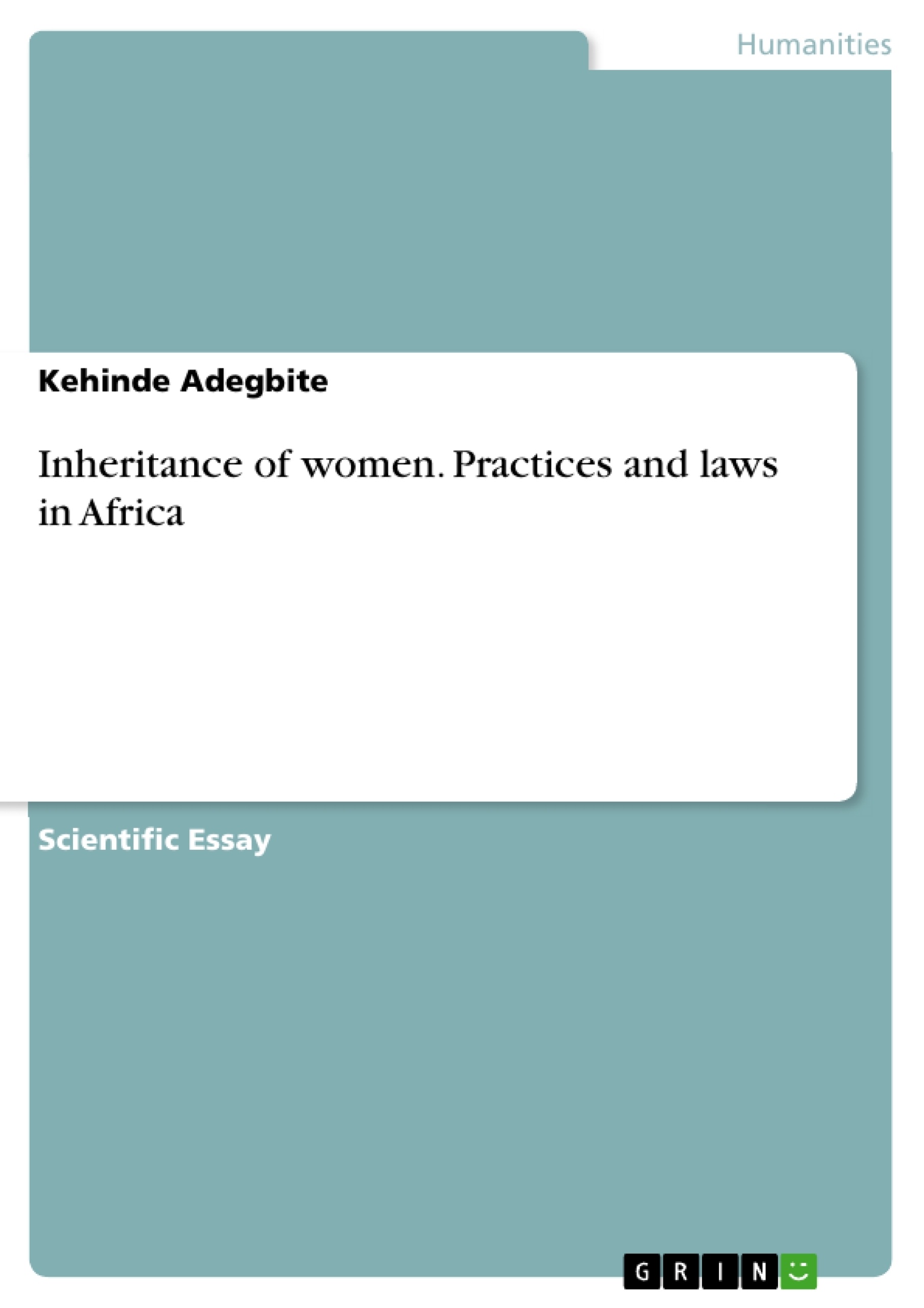From time immemorial, women have suffered greatly and disproportionately in comparison to their male counterpart. Most societies have been essentially patriarchal but in no area of political, social and religious life has the despicable plight of women been more conspicuously noticeable than in the aspect of inheritance. Over time, concrete efforts have been made in the Western world to stem this tide, while African societies, on the other hand, have not recorded much achievement in this area. National constitutions of African and other developing countries tend to prohibit discriminations against women in property inheritance, yet discriminatory traditional and customary practices persist. International treaties are merely ratified by these countries without committed implementation. This paper is posed to interrogate existing practices and laws in African and developing societies regarding the right of women to inherit property on the same footing as men in the light of developments in the Western world. At the end, recommendations are proffered so that those countries of the world which are lagging behind in treating women appropriately may have a second thought.
Inhaltsverzeichnis (Table of Contents)
- 1. INTRODUCTION
- 2. DEFINITION OF TERMS
- 3. WOMEN AND INHERITANCE: THE AFRICAN CONTEXT
- 3.1 Testate Succession: Nigeria
- 3.2 Intestate Succession: Nigeria
- 4. WOMEN AND INHERITANCE: WORLD'S MAJOR RELIGIONS
- 5. ADMINISTRATION OF ESTATE LAW
- 6. RECOMMENDATIONS
Zielsetzung und Themenschwerpunkte (Objectives and Key Themes)
This paper aims to analyze the legal and customary practices surrounding women's inheritance rights in Africa and compare them to global standards. The focus is on highlighting the discrepancies between legal provisions and actual practice, particularly in African countries, and to advocate for changes in legal frameworks and societal attitudes to ensure women's equal access to inheritance.
- Discrimination against women in inheritance across cultures and historical periods
- Legal reforms and societal changes in the Western world that have improved women's inheritance rights
- Challenges and persisting discriminatory practices against women in inheritance in Africa
- Analysis of inheritance laws and practices within major religions
- Recommendations for promoting equitable inheritance rights for women in Africa and other developing countries
Zusammenfassung der Kapitel (Chapter Summaries)
The introduction provides a historical overview of the struggle for women's rights, highlighting the disparity between Western and non-Western societies. It emphasizes the persistence of discriminatory practices in Africa despite legal reforms and international human rights conventions. The paper then focuses on the legal framework and customary practices in Africa, particularly in Nigeria, comparing these to the global context and highlighting discrepancies between legal provisions and actual practices.
The chapter on world religions delves into the specific perspectives on inheritance in Islam, Christianity, and Hinduism, analyzing the cultural context of each religion and its impact on women's rights. The paper then discusses the practicalities of estate administration and explores legal interventions in African customary practices. The paper concludes with recommendations for promoting equitable inheritance rights for women in Africa and developing countries.
Schlüsselwörter (Keywords)
The primary focus of this paper is on the analysis of legal and customary practices surrounding women's inheritance rights. Key terms include women, inheritance, Africa, legal system, treaties, constitutions, Islam, Christianity, Hinduism, customs, and Western countries. The paper emphasizes the need for equitable access to inheritance for women and seeks to highlight the historical and cultural factors that have contributed to and perpetuated existing disparities.
Frequently Asked Questions
Why is women's inheritance a major issue in Africa?
Despite national constitutions prohibiting discrimination, many African societies remain deeply patriarchal, with customary and traditional practices often denying women the same inheritance rights as men.
What is the difference between testate and intestate succession in Nigeria?
Testate succession occurs when there is a valid will, while intestate succession happens without one. In both cases, especially the latter, women often face hurdles due to customary laws that favor male heirs.
How do major world religions view women's inheritance?
The paper analyzes perspectives from Islam, Christianity, and Hinduism, noting that while religious texts may provide for women, cultural interpretations often limit these rights in practice.
Why do discriminatory practices persist despite international treaties?
Persisting traditional beliefs and a lack of committed implementation of ratified treaties by national governments allow discriminatory customs to take precedence over modern legal frameworks.
What are the recommendations for improving inheritance rights?
Recommendations include legal reforms, better enforcement of constitutional rights, and societal education to change the patriarchal attitudes that lag behind global standards of equality.
- Citation du texte
- Kehinde Adegbite (Auteur), 2014, Inheritance of women. Practices and laws in Africa, Munich, GRIN Verlag, https://www.grin.com/document/276769



